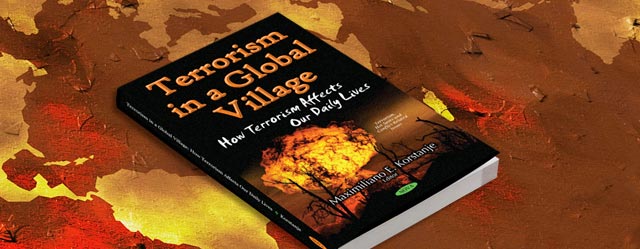El nuevo libro del Profesor Maximiliano E. Korstanje

El Profesor de la Facultad de Ciencias Económicas, Maximiliano E. Korstanje, lanzó el libro “Terrorism in a Global Village: How Terrorism Affects Our Daily Lives”. En su publicación realiza un debate de autores sobre el "flagelo del terrorismo", tomando como referencia el acontecimiento del 9/11. El libro discute en qué medida el terrorismo está cambiando los comportamientos sociales, las instituciones y la democracia.
Publicación: Terrorism in a Global Village: How Terrorism Affects Our Daily Lives. Editorial Nova.
Editor: Maximiliano E. Korstanje (Universidad de Palermo)
Descripción:
This book centers not only on the “scourge of terrorism”, a problem which concerns policy-makers, officials and governments worldwide, but dissects the reasons and effects it has on people’s daily lives. Focusing on 9/11 as the founding event, terrorism and the attention given by the media and news containing violence-related content paved the way for the rise of a new stage of capitalism.
Authors invited to this project discuss with accuracy to what extent terrorism is changing day-to-day behaviours, social institutions and democracy. Basically, the rise and expansion of globalization, which crystalized into a more mobile world, alluded to a culture of instantaneity where news on terror produces a double-edge effect. On one hand, terrorist cells are prone to develop crueler and further violent tactics to perpetrate their attacks since the constant media coverage produces a process of desensitization in audiences. On another hand, the “war on terror” is discursively manipulated to impose some restrictive economic policies that would otherwise be neglected. Lastly, not only does terrorism seem to affect the tenets of democracy, but it also accelerates the rise of populist leaders in the decades to come. Since terrorism is subtly changing our lives, this book offers an all-encompassing model to expand the current understanding of students, scholars and policy makers in order to prioritize republicanism over “the concept of security”. In this vein, Latin America has much to say to shed light on how terrorism effaces democracy. In view of the American sentiment of exemplarity adjoined to the commoditization of death in capitalist societies, the discourse of fear may very well lead to pathological reactions that prevent “hospitality”, which was historically the touchstone of the Western world.
Índice:
Chapter 1. Exploring the Archetype of Americaness and the Excemplary Principle: The Fear of Traveling Abroad (Maximiliano E. Korstanje and Geoffrey Skoll, University of Palermo, Argentina, and others)
Chapter 2. Asymmetrical Hotel Threats (Ioannis Galatas and Peter Tarlow, CBRNe Research Associate, Center for Security Studies (KEMEA), Athens, Greece, and others)
Chapter 3. How Terrorism Has Affected Me (Christopher Bach, Northeastern University, USA)
Chapter 4. Craving for the Consumption of Suffering and Commoditization of Death: The Evolving Facets of Thana Capitalism (Maximiliano Korstanje and Babu P. George, University of Palermo, Argentina, and others)
Chapter 5. The Philosophical Risk in the Tourism Research: Risk and Tourism (Celeste Nava Jiménez, Universidad de Guanajuato, México)
Chapter 6. Postcards from Hell: Evil and Islamic State (Primavera Fisogni, PhD in Metaphysics and Journalist, Editorial chief, La Provincia daily newspaper, Como, Italy)
Chapter 7. Dark Tourism and Digital Gift Economies: Some Epistemological Notes (Rodanthi Tzanelli, Sociology and Social Policy, University of Leeds, UK)
Chapter 8. Great Terror and Neo-liberalism in Chile (Freddy Timmermann, Catholic University Silva Henriquez, Santiago, Chile)






